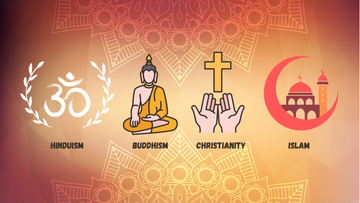The Universal Language of Mantras : How They Connect People Across Cultures
by Pushpanjali Kumar on Oct 21, 2023

Essence Of Mantras
Mantras are sacred sounds, words, or phrases that hold deep spiritual significance in various cultures and religions, including Hinduism, Buddhism, Jainism, and Sikhism, among others. These sacred utterances are often repeated, either silently or aloud, as a form of meditation, Prayer, or devotion. Mantras are believed to carry profound vibrational energies that can transform one's consciousness, leading to inner peace and spiritual awakening.
Mantras as a Bridge Across Cultures
Shared Human Experience: At their core, mantras tap into universal human experiences, emotions and aspirations. Whether one is seeking inner peace, healing, strength, or enlightenment, mantras provide a common ground for individuals to connect with their inner selves and with each other, transcending cultural boundaries.
Cultural Adaptation: Mantras have a remarkable ability to adapt to different cultural contexts. When embraced by people from diverse backgrounds, mantras often incorporate elements of local culture while retaining their spiritual essence. For example, Tibetan Buddhists have their own unique mantras, as do practitioners of Hinduism in India.
Global accessibility: In todays interconnected world, mantras are readily accessible to people of all cultures through books, online resources, mantra singing plush toys and spiritual communities. This accessibility has made it easier for individuals to explore and integrate mantras into their own spiritual practices.
Mantras In Different Culture
Mantras are not limited to any single culture or religion. They are found in various forms across the globe:
Hinduism: Om, often referred to as the "universal sound," is one of the most well-known mantras in Hinduism. It represents the essence of the ultimate reality and connects individuals to the divine. Also, there are mantra chanting plush toys like mantra chanting baby ganesha, mantra chanting baby rama, mantra chanting baby krishna, Devi Durga, Devi Lakshmi.
Buddhism: Buddhists use mantras like "Om Mani Padme Hum" to invoke compassion and wisdom. These mantras are recited by Buddhists from different backgrounds worldwide.
Christianity: The repetition of phrases such as "Kyrie Eleison" (Lord, have mercy) or "Ave Maria" (Hail Mary) functions similarly to mantras in Christian traditions. They are used for meditation and prayer.
Islam: In Sufism, the practice of dhikr involves repeating the names or attributes of God, serving as a form of mantra meditation.
Mantras For Unity and Harmony
The universal appeal of mantras lies in their power to foster unity and harmony among individuals, regardless of their cultural backgrounds. Here are some ways mantras contribute to this unity:
Shared Intentions: Different cultures unite to chant for peace and healing.
Respect for Diversity: Mantras foster respect for varied beliefs.
Cultural Exchange: Exploring Diverse mantras leads to understanding different cultures.
Conclusion
Mantras in any form, like soothing chants and mindfulness practices serve as a universal language that transcends cultural barriers, connecting people across the world through their shared human experiences and spiritual aspirations. Regardless of one's cultural background or religious affiliation, the power of mantras to instill inner peace, foster unity, and promote a sense of oneness is undeniable.





